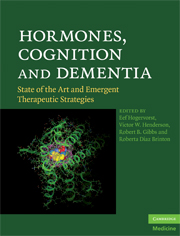Book contents
- Hormones, Cognition and Dementia
- Hormones, Cognition and Dementia
- Copyright page
- Contents
- Contributors
- Preface
- Section 1 Estrogens and cognition: perspectives and opportunities in the wake of the Women's Health Initiative Memory Study
- Chapter 1 Women's Health Initiative Memory Study (WHIMS) program: emerging findings
- Chapter 2 Identifying risk factors for cognitive change in the Women's Health Initiative: a neural networks approach
- Chapter 3 Estrogen therapy – relationship to longevity and prevalent dementia in the oldest-old: the Leisure World Cohort Study and the 90+ Study
- Chapter 4 The critical window hypothesis: hormone exposures and cognitive outcomes after menopause
- Chapter 5 Animal studies that support estrogen effects on cognitive performance and the cholinergic basis of the critical period hypothesis
- Chapter 6 The healthy cell bias of estrogen action through regulating glucose metabolism and mitochondrial function: implications for prevention of Alzheimer's disease
- Section 2 Varieties of estrogenic therapy
- Section 3 Potential modulators and modifiers of estrogenic effects
- Section 4 Possible genetic factors related to hormone treatment effects
- Section 5 Testosterone, estradiol and men, and sex hormone binding globulin
- Section 6 Gonadotropin effects
- Index
- Plate Section
Chapter 3 - Estrogen therapy – relationship to longevity and prevalent dementia in the oldest-old: the Leisure World Cohort Study and the 90+ Study
from Section 1 - Estrogens and cognition: perspectives and opportunities in the wake of the Women's Health Initiative Memory Study
Published online by Cambridge University Press: 06 July 2010
- Hormones, Cognition and Dementia
- Hormones, Cognition and Dementia
- Copyright page
- Contents
- Contributors
- Preface
- Section 1 Estrogens and cognition: perspectives and opportunities in the wake of the Women's Health Initiative Memory Study
- Chapter 1 Women's Health Initiative Memory Study (WHIMS) program: emerging findings
- Chapter 2 Identifying risk factors for cognitive change in the Women's Health Initiative: a neural networks approach
- Chapter 3 Estrogen therapy – relationship to longevity and prevalent dementia in the oldest-old: the Leisure World Cohort Study and the 90+ Study
- Chapter 4 The critical window hypothesis: hormone exposures and cognitive outcomes after menopause
- Chapter 5 Animal studies that support estrogen effects on cognitive performance and the cholinergic basis of the critical period hypothesis
- Chapter 6 The healthy cell bias of estrogen action through regulating glucose metabolism and mitochondrial function: implications for prevention of Alzheimer's disease
- Section 2 Varieties of estrogenic therapy
- Section 3 Potential modulators and modifiers of estrogenic effects
- Section 4 Possible genetic factors related to hormone treatment effects
- Section 5 Testosterone, estradiol and men, and sex hormone binding globulin
- Section 6 Gonadotropin effects
- Index
- Plate Section
Summary
To our knowledge, the study by Kawas et al. is the first observational study to describe a significant increase of dementia risk in older women who had been using hormones for five to nine years. The Leisure World Cohort Study was initiated in 1981 and consisted of women residing in a California retirement community (N = 8,801) who had completed a postal survey including details of estrogen therapy [ET]. After 22 years of follow-up, ET users (ever) had a 10% lower age-adjusted mortality than lifetime non-users. This risk was further decreased with increasing duration, but was not related to dose (0.625 mg vs. 1.25 mg). The relationship did not significantly change when adjusted for potential confounders, including exercise, body mass index, smoking, and medical histories related to mortality. The 90+ Study was initiated to directly examine surviving members of the cohort to determine clinical and functional status. Research participants who were alive and aged 90 and older on January 1, 2003 were invited to participate (N = 706 women, 90–106 years old). Prevalence of all-cause dementia was 45% in these women, but was not lower in ever-users of estrogen. Somewhat surprisingly, women who had used estrogen for five to nine years appeared to have an increased prevalence of dementia (odds ratio (OR) = 2.02, 95% CI 1.17–3.45), but longer or shorter duration of use was not associated with increased or decreased risk. This chapter discusses these results with regards to timing of exposure and age.
- Type
- Chapter
- Information
- Hormones, Cognition and DementiaState of the Art and Emergent Therapeutic Strategies, pp. 25 - 31Publisher: Cambridge University PressPrint publication year: 2009



